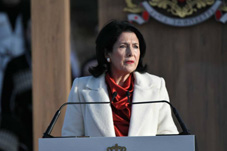
Zourabichvili criticized for presidential pardons
By Natalia Kochiashvili
Wednesday, September 18
Ruling Georgian Dream party members say that legal changes are needed to specify all the procedures and preconditions for the presidential pardon of inmates.
The statements come after two scandalous pardons by President Zourabichvili. The first one was sentenced for the murder of a police officer and another was convicted for murder. Aslan Bezhanidze was convicted for the murder of Otkhmezuri in 2016. The incident took place back in 2004 during a dispute about a mobile phone in central Tbilisi, the Prosecutor’s Office reported in 2016. The list of pardons on August 28 is confidential, but Bezhanidze’s lawyer confirmed that the man was pardoned by the president two weeks ago and the decision was “fair.” Wrestler Ramaz Devadze, convicted of killing 22-year-old Batumi policeman, Tarash Mukbaniania, a Batumi policeman, was also among those pardoned by the president on August 28.
“When it comes to the pardon of prisoners nobody, including the president, must act based on their own view. There must be clear preconditions to allow the pardon,” Giorgi Volski member of the ruling party “Georgian Dream” said.
Tbilisi Mayor Kakha Kaladze stated that pardoning of the murderer of David Otkhmezuri was “unacceptable,” adding that the president is not also against the legal changes to regulate the pardon issue. "I understand, that this is the president's authority, but the legislative level has to reconsider this issue. As we have heard, the President herself has such an initiative,” Kaladze told reporters.
„The candidates for pardon on the occasion of Mariamoba were not reconciled with the Penitentiary Service and the Ministry of Justice,“ - Tea Tsulukiani, the Minister of Justice of Georgia, said.
The president is the only authorized official to pardon inmates in Georgia. In March 2019, during her speech in parliament, Zourabichvili said that the pardon commission, which is now subordinated to the president, may move under the control of the Ministry of Justice, with more state agencies involved in the discussion of applications for pardon. She said that the president will make a final decision on pardon. This change has not been implemented so far.
Earlier in September, due to the public’s reaction, President Zourabichvili released a statement on the pardon of convicts. According to her, due to the legal nature of the pardon, the specific details, circumstances, and motivation cannot be publicly discussed.
In order for such pardons not to cause stirs in the community in the future, the President proposes the following: “Accelerate the process started in my administration and, together with the legislature and relevant agencies, refine the right to use the pardon to maintain it as a humane exception and to reduce the risks that have always been associated with it,” said Zourabichvili.
How is the pardon process going? As of now, there is no answer to the question of whether or not the Pardon Commission is operational. The President's administration is silent, and the official website lists the chronology of the pardon and the legislative acts in the section of the Pardon Commission.
Amid so many question marks, it is only known that Salome Zourabichvili wanted to join the Ministry of Justice's pardon commission. That is what he said in his speech to Parliament in early March 2019, but that did not happen.
During Giorgi Margvelashvili's presidency (2013-2018), the Pardon Commission worked as follows: Applications for pardoners and materials about them were collected at the commission where they were fired. Then the list was submitted to the President.
The criteria by which the previous president's commission assessed the appropriateness of pardoning: Crime; prisoner’s past; deportment at the jail; recommendation; report of a social worker and the position of the victim and the family. By the current law, the President has the right to pardon any person without any criteria.
The President’s Pardon Commission is composed of 11 individuals, mainly lawyers from the civil sector, public figures, the Public Defender and a spiritual representative from Georgia’s Patriarchate. The group must discuss all cases sent to the Pardon Commission by inmates or their families and decide which prisoners they believe deserve to be pardoned. The list then is sent to the president to be signed.


